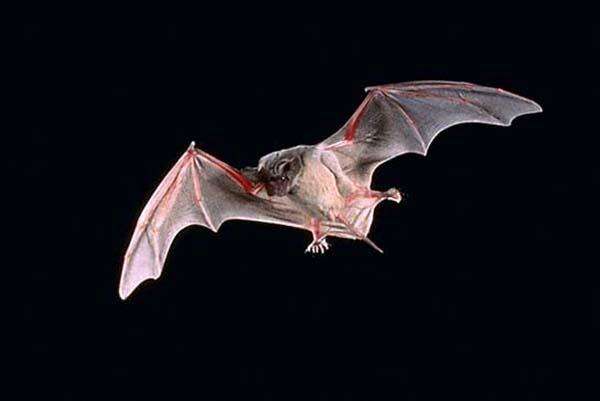(单词翻译:单击)
听力文本
This is Scientific American — 60-Second Science. I'm Christopher Intagliata.
Just as humans understand the shape of our surroundings by how light reflects off objects, bats use reflections of sounds they produce instead—what's called echolocation. But despite their excellent sensing abilities, one type of obstacle vexes the animals: smooth vertical surfaces, like windows. Because windows reflect almost all the bats' calls away from bats at an angle—creating the illusion of empty space.
"To better understand it you can actually use a visual analogy." Stefan Greif, a sensory ecologist at the Max Planck Institute for Ornithology. Imagine standing in a dark room, he says, beside a mirror. "If then if you take a flashlight in your hand and shine it on the side onto this mirror, you would see that all the light is reflected away. You'd see it on the other side of the wall. So even visually this would look to you like there's a hole in the wall. There's nothing coming back from this place."
Light wouldn't come back to you unless you aimed the flashlight more or less perpendicular to the mirror—and same for bats and their calls. This perceptual glitch meant that in lab tests 90 percent of bats banged into a smooth vertical surface. (And by the way, the researchers say that none were hurt.) But here's the interesting bit: bats never smashed into a smooth horizontal surface.

Greif says that's because plenty of horizontal planes exist in nature, like lakes and ponds. And even though a lake reflects calls away from the bat, bats have evolved to perceive the absence of sound reflections from horizontal surfaces as water. In fact previous studies have shown that bats will actually dip down for a drink from smooth horizontal surfaces—whether they're water-filled or not. The study is in the journal Science.
So what are conservationists to do? "Obviously we have to be realistic, right? That might mean we can't start making all our windows rough and textured." But if we build near crucial bat habitats, we could install acoustic deterrents to drive the flying mammals away from buildings. "And certainly you could start looking at architectural possibilities, if you don't make a smooth surface smooth all the way but make ridges inside, like a mosaic, for example." And perhaps bat-friendly architecture would result in new designs...pleasing to human perception, too.
Thanks for listening for Scientific American — 60-Second Science Science. I'm Christopher Intagliata.
参考译文
这里是科学美国人——60秒科学。我是克里斯托弗·因塔利亚塔。
正如我们人类通过物体反射的光线来了解周围环境一样,蝙蝠也会利用自己声音所产生的回声来推测环境情况——这被称为回声定位。但是,虽然蝙蝠拥有出色的感知能力,但是有一种障碍依然令它们感到困扰:像窗户那样的光滑垂直面。因为窗户会以某种角度将蝙蝠的所有声音反射到其他地方,创造出一种空白空间的错觉。
“为了更好地理解这种情况,可以利用视觉类比。”马克斯·普朗克鸟类研究所的感官生态学家斯特凡·格雷夫说道。他说,想象自己站在一个黑暗的房间里,旁边有一面镜子。“如果你拿手电往镜子上照,你会看到所有的光都被反射出来。所有光都反射到另一边墙上。可以说,看上去就像墙上有个洞。但洞里不会有光反射出来。”
除非你调整手电筒的角度使其基本垂直于镜子,光才会反射到你身上,这与蝙蝠和它们的叫声一样。这种感知故障意味着,在实验室测试中90%的蝙蝠会撞到光滑的垂直面。(顺便说一下,研究人员说试验中没有蝙蝠受伤。) 但有趣的是:蝙蝠从来不会撞到光滑的水平面。
格雷夫表示,这是因为自然界中存在大量的水平面,比如湖泊和池塘。即使湖泊会将蝙蝠的叫声反射到其他地方,但是蝙蝠已经进化到可以将水平面的声音反射空白视为水面。事实上,之前的研究已经表明,蝙蝠还会落到光滑的水平面去喝水,无论那是不是水面。这项研究结果发表在《科学》期待上。
了解这些信息以后,自然资源保护主义者应该做些什么呢?“显然我们必须现实点儿,对吧?我们不能把所有窗户弄成粗糙又有纹路的样子。”不过,如果我们建造重要的蝙蝠栖息地,我们就可以安装声音障碍物,使这些会飞的哺乳动物远离建筑物。“当然,你也可以从建筑可能性上着手,比如表面不做成光滑的,而是在内部做出一些隆起,就像马赛克那样。”也许“蝙蝠友好型”建筑会产生全新的设计,当然这种设计还能满足人类的感官。
谢谢大家收听科学美国人——60秒科学。我是克里斯托弗·因塔利亚塔。
译文为可可英语翻译,未经授权请勿转载!
重点讲解
重点讲解:
1. more or less 或多或少;大概;几乎;
例句:We decided, more or less on a whim, to sail to Morocco.
我们多少有点心血来潮,决定航海去摩洛哥。
2. by the way 顺便地;附带说一句;
例句:By the way, I can't take a morning flight.
对了,我不能坐上午的飞机走。
3. even though 即使;尽管;纵然;
例句:He had no plans to retire even though he is now very comfortably off.
尽管现在很宽裕,他却没打算退休。
4. result in 导致;引起;造成;
例句:Warren also allows that capitalist development may, in its early stages, result in increased social inequality.
沃伦也承认资本主义发展初级阶段可能会导致社会不平等现象加剧。


